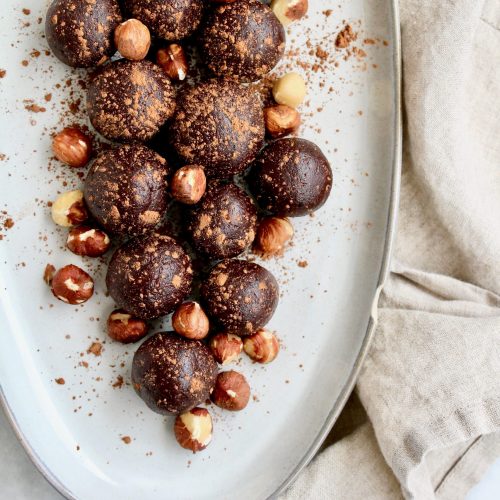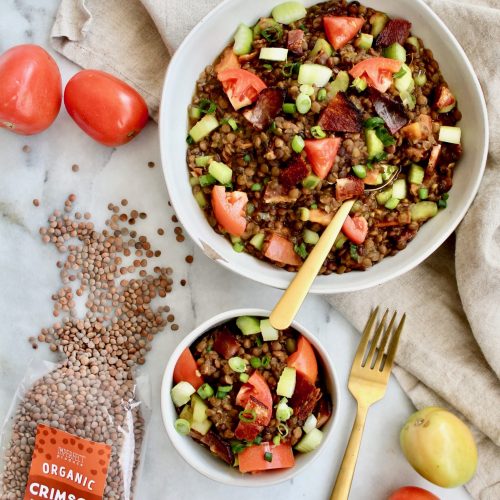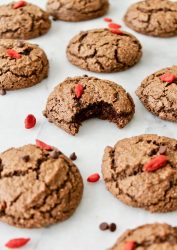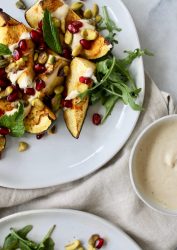One of the silver linings of leaving our youthful and carefree teenage years behind us is bidding adieu to the acne that can so often accompany them… or so we thought. Dealing with breakouts is frustrating. Having to deal with breakouts in your 30’s or 40’s is total BS. So if you’re still fighting (or newly experiencing) pesky pimples and you’re well past your teenage years, you’re not not alone.
From our experience, acne can typically be linked back to two root causes: certain acne-provoking foods and hormones that are out of whack. Let’s start with food.
Food
Any food sensitivity left unaddressed can lead to leaky gut and inflammation (which can then lead to acne). But the two biggest dietary provokers of acne, hands-down, are dairy and sugar.
Dairy
Dairy is one of the most common food sensitivities which can lead to systemic inflammation and acne (acne is often an inflammatory condition). Milk and dairy products also contain hormones which can tinker with our own hormones. Specifically, milk contains precursors to the hormone DHT (a more potent form of testosterone) and increases levels of insulin-like growth factor (IGF-1), both which increase sebum, or oil, production in the skin.
Sugar
A high glycemic diet, a.k.a. a diet high in refined carbohydrates and sugar, can wreak havoc on skin. Perhaps the most important thing to understand about sugar is that it (along with refined flours from cookies, pasta, pastries, crusts, bread, donuts, etc.) absolutely has an effect on your hormones. A high-carb or high-sugar diet creates high circulating levels of insulin and insulin is a hormone. A high-carbohydrate diet also increases conversion of testosterone to its more potent form, DHT, which increases sebum production and worsens acne. So, if you’re struggling with acne it’s time to say sayonara to sugar.
Other foods that can cause flare-ups, in addition to acne and refined carbohydrates, are foods high in iodine (found in table salt and salty foods) and processed, high-inflammatory oils (canola oil, trans fatty acids, soybean oil, corn oil, safflower oil).
The final, yet crucial, thing to know about food and acne is that your digestive tract is basically your “inside” skin. Your “outside” skin is often just a reflection of what’s going on inside your gut. So when your insides are running smoothly, your skin should reflect that. Alternatively, when you’re eating inflammatory foods or foods that trigger leaky gut, your outside skin will likely reflect that.
Now that we’ve talked about what to avoid, let’s talk about what to add. This shouldn’t be a surprise but be sure to drink lots of pure, filtered water and eat a diet filled with high-fiber and high-antioxidant fruits and veggies, organic meats, and plenty of healthy fats. You may also want to load up on foods high in zinc, omega-3’s, vitamin C, and selenium since these have been shown to improve skin health and reduce acne. Also, check out this post on the top superfoods we recommend adding into your diet.
Hormones
Our hormones are constantly in flux, especially as women. But certain foods (as discussed earlier) and lifestyle choices can easily disrupt our hormones and put them out of balance.
Stress
What’s stress gotta do with hormones? So glad you asked. Ever heard of “stress hormones?” The term generally refers to cortisol, a hormone that’s released in response to stress. Cortisol also happens to increase sebaceous gland activity (increases oil production) which can worsen acne. Stress can also mess with digestion and contribute to leaky gut which, as we discussed earlier, can also worsen skin conditions like acne. So find some balance – take a yoga class, spend time with friends, meditate, and get outside for some fresh air and sunshine. You can also try adding adaptogenic herbs like ashwagandha or using essential oils like lavender to help you unwind.
Your Monthly Cycle
If your acne is more prevalent around your menstrual cycle, especially the week before and the week of your period, and predominantly appears around your mouth and chin, your acne may be attributed to a hormonal imbalance. The first thing to do is clean up your diet, ditching sugary foods and refined carbohydrates. Balance blood sugar and support healthy hormone production by eating a balanced diet with a mix of carbohydrates from fruits, veggies, whole grains and legumes; clean protein from organic, sustainable animal sources; and healthy fats like nuts, seeds, olives, avocado, fatty fish, coconut, and olive oil. Next, add liver-supporting foods and herbs like cruciferous veggies (broccoli, cauliflower, brussel sprouts), dandelion, burdock root, and milk thistle. These will help your body break down and eliminate excess estrogen and other hormones that may be leading to imbalances. If acne persists, it may be helpful to work with a professional to get lab work and further testing.
Other Tips to Make Your Skin Glow
- Apple cider vinegar: Use it to cleanse inside and out by having 1-2 tablespoons every morning, mixed in a bit of warm water. Use it topically by mixing with water, aloe, or rose water and apply it using a cotton pad (like a toner). Try one of these morning tonics to help clarify your skin.
- Coconut oil: Naturally antimicrobial, coconut oil can fight acne-causing bacteria as it moisturizes. Plus it makes you smell like vacation.
- Zinc: Consider supplementing with zinc. Dr. Michael Murray says zinc deficiency can actually lead to breakouts. Take 50 mg a day to help prevent future breakouts, help skin heal from past breakouts, and support your immune system.
- Gentle cleansers: Castile soap or simple oil-based cleansers (yep, oil!) can be great for clear, hydrated skin.
- Witch hazel: Witch hazel is a natural non-drying astringent that can help hydrate and tone skin.
- Tea tree oil: Got a zit? Don’t pop it – instead, apply a little TTO which has natural antibacterial properties to help get rid of your pimple faster.
- Jojoba oil: Jojoba oil mimics your skin’s natural oils and is a great natural makeup remover and moisturizer.
Previous Posts

Recipes
Chocolate Hazelnut Truffles
Chocolate = love, especially near Valentine’s day. So we’re spreadin’ the love with our favorite recipe for Chocolate Hazelnut Truffles! These chocolate truffles have no added sugar (they’re naturally sweetened with dates!) and plenty of healthy fats from hazelnuts and coconut. We think you’ll ❤️them.
Read More
Recipes
“Imperfect” BLT Crimson Lentils
We’re so excited to partner with Imperfect Foods, a company on a mission to eliminate food waste and build a better food system for everyone – a mission we support 100%. We used our Imperfect Foods to make these delicious “Imperfect” BLT Crimson Lentils – give ’em a try!
Read More
Lifestyle
6 Foods to Get You In the Mood on Valentine’s Day
What does nutrition have to do with your sex life? Well, as it turns out, a lot. Here are the best foods to eat to boost your libido.
Read More


